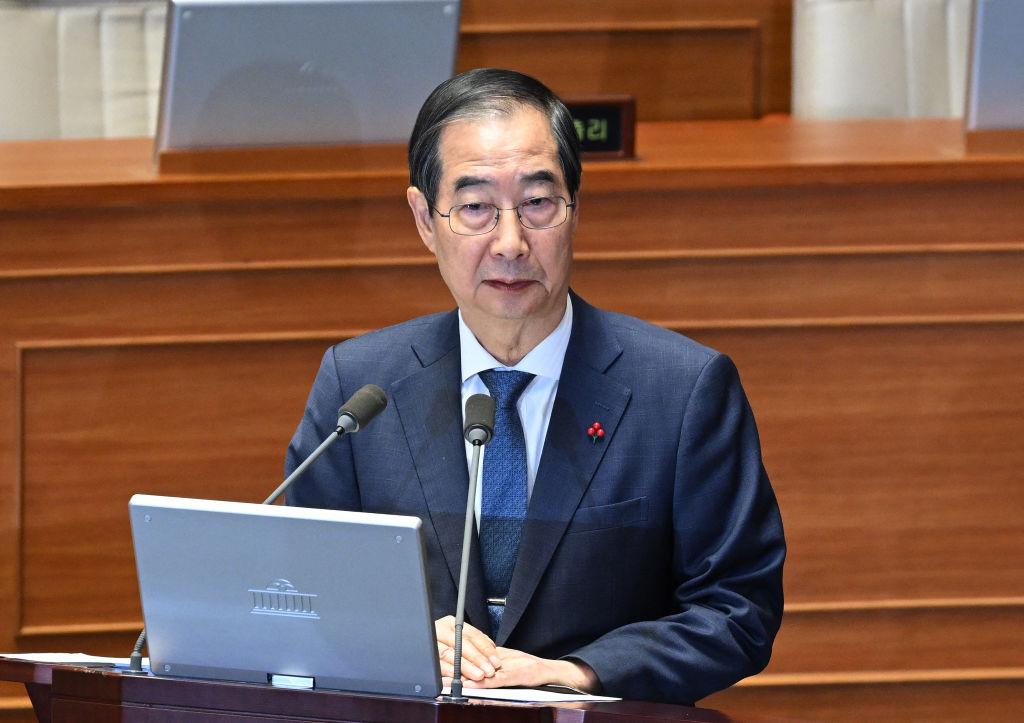South Korea plunged deeper into political turmoil as parliament impeached acting president Han Duck-soo, marking the first time in the nation’s history that an acting leader has been removed. The move follows the impeachment of President Yoon Suk Yeol earlier this month after his controversial martial law declaration. The unfolding crisis has already rattled markets and raised concerns about the nation’s economic stability.
Impeachment Sparks Unprecedented Political Crisis
Han’s impeachment stems from his refusal to appoint three new judges to the Constitutional Court, a decision that fueled opposition anger. The court, tasked with ruling on Yoon’s impeachment, requires at least six judges to uphold such decisions. With only six judges currently seated, Han’s inaction created the possibility of a single dissenting vote saving Yoon.
Finance Minister Choi Sang-mok has assumed the role of acting president while retaining his cabinet position. He pledged to “minimize confusion in state affairs” but has not clarified whether he will appoint new judges, leaving South Korea’s political future uncertain. Analysts warn that Choi’s refusal to act could result in his own impeachment, prolonging the crisis.
Should the Constitutional Court uphold Yoon’s impeachment, South Korea could face new presidential elections within 60 days. The opposition Democratic Party (DP), led by Lee Jae-myung, is poised to capitalize on the chaos. Lee narrowly lost to Yoon in 2022 and has positioned the DP as a left-leaning alternative advocating for stronger ties with China and North Korea.
Economic Fallout Looms as Markets React
The political uncertainty has already taken a toll on South Korea’s economy. The Bank of Korea reported a sharp drop in consumer confidence, with the composite consumer sentiment index falling by 12.3 points to 88.4 in December—the largest decline since the onset of the COVID-19 pandemic. A reading below 100 signals economic contraction.
South Korea’s GDP growth remains stagnant at 0.1% for the third quarter, with projections for just 2.0% growth this year. Analysts fear the political polarization could deter foreign investment and disrupt the nation’s industrial sector, with critical December PMI and trade data due next month.
The Korean won fell 0.3%, while the KOSPI index dropped 1.0% on Monday. Both have declined approximately 4% since Yoon declared martial law on December 3. Comparisons to Thailand’s prolonged economic stagnation following political upheaval a decade ago have heightened concerns about South Korea’s economic trajectory.
Netizens Voice Concerns Over Leadership Crisis
The crisis has sparked heated discussions online. User @KoreaWatcher tweeted, “Unprecedented chaos in South Korea. Will the Constitutional Court bring stability or deepen the divide?” Another user, @InvestorFocus, warned, “Political instability is a red flag for markets. Investors should brace for more volatility.”
Others expressed frustration with the current leadership. “Han’s refusal to act worsened the situation. Choi must step up or risk further collapse,” posted @CivicEngageK. Meanwhile, @AsiaAnalyst observed, “The DP is poised to benefit from this mess, but will they deliver lasting solutions?”
Optimists offered cautious hope. “A clean election could reset South Korea’s future,” wrote @PolicyOptimist. Conversely, @EconRealist tweeted, “This crisis is a stark reminder of how politics and economics are deeply intertwined.”



 Maduro Seeks Dismissal of U.S. Drug Trafficking Case, Citing Sanctions Interference
Maduro Seeks Dismissal of U.S. Drug Trafficking Case, Citing Sanctions Interference  European Stocks Slide as Middle East War Fears and Rising Oil Prices Shake Markets
European Stocks Slide as Middle East War Fears and Rising Oil Prices Shake Markets  Democratic Attorneys General Sue Trump Administration Over CDC Childhood Vaccine Schedule Changes
Democratic Attorneys General Sue Trump Administration Over CDC Childhood Vaccine Schedule Changes  Argentina Tax Reform 2026: President Javier Milei Pushes Lower Taxes and Structural Changes
Argentina Tax Reform 2026: President Javier Milei Pushes Lower Taxes and Structural Changes  Santos Wins Court Case Over Net Zero and Sustainability Claims
Santos Wins Court Case Over Net Zero and Sustainability Claims  Medical Groups Sue FTC Over Gender-Affirming Care Investigations Amid Trump Policy Dispute
Medical Groups Sue FTC Over Gender-Affirming Care Investigations Amid Trump Policy Dispute  Australian Job Advertisements Hit 16-Month High as Labour Market Stays Resilient
Australian Job Advertisements Hit 16-Month High as Labour Market Stays Resilient  Bank of Japan Signals Further Interest Rate Hikes as Inflation Trends Toward 2% Target
Bank of Japan Signals Further Interest Rate Hikes as Inflation Trends Toward 2% Target  Federal Judge Blocks Virginia Social Media Age Verification Law Over First Amendment Concerns
Federal Judge Blocks Virginia Social Media Age Verification Law Over First Amendment Concerns  Middle East Conflict Escalates After Khamenei’s Death as U.S., Israel and Iran Exchange Strikes
Middle East Conflict Escalates After Khamenei’s Death as U.S., Israel and Iran Exchange Strikes  Suspected Drone Strike Hits RAF Akrotiri Base in Cyprus, Causing Limited Damage
Suspected Drone Strike Hits RAF Akrotiri Base in Cyprus, Causing Limited Damage  Pentagon Downplays ‘Endless War’ Fears After U.S. Strikes on Iran Escalate Conflict
Pentagon Downplays ‘Endless War’ Fears After U.S. Strikes on Iran Escalate Conflict  Oil Prices Surge After U.S.-Israel Strikes on Iran, Raising Strait of Hormuz Supply Fears
Oil Prices Surge After U.S.-Israel Strikes on Iran, Raising Strait of Hormuz Supply Fears  FedEx Sues U.S. Government for Refund of Trump-Era Emergency Tariffs After Supreme Court Ruling
FedEx Sues U.S. Government for Refund of Trump-Era Emergency Tariffs After Supreme Court Ruling  Peter Mandelson Arrested in London Amid Jeffrey Epstein Ties Investigation
Peter Mandelson Arrested in London Amid Jeffrey Epstein Ties Investigation  Trump Warns Iran as Gulf Conflict Disrupts Oil Markets and Global Trade
Trump Warns Iran as Gulf Conflict Disrupts Oil Markets and Global Trade  U.S.-Israel War on Iran Escalates as Gulf Conflict Disrupts Oil, Air Travel and Regional Security
U.S.-Israel War on Iran Escalates as Gulf Conflict Disrupts Oil, Air Travel and Regional Security 






























